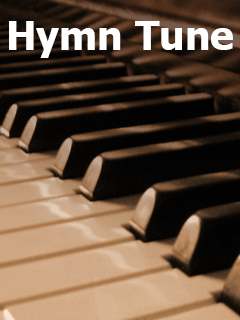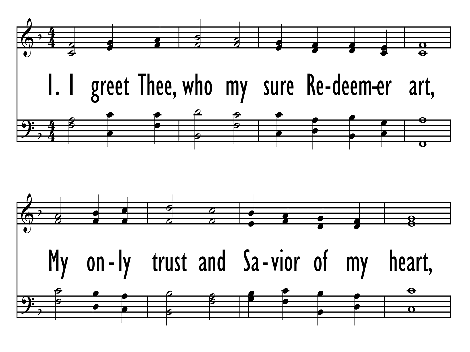- |
User Links
SONG 24

SONG 24
Composer: Orlando Gibbons (1623)Published in 40 hymnals
Printable scores: PDF, MusicXML
Audio files: MIDI, Recording
Composer: Orlando Gibbons
 Orlando Gibbons (baptised 25 December 1583 – 5 June 1625) was an English composer, virginalist and organist of the late Tudor and early Jacobean periods. He was a leading composer in the England of his day.
Gibbons was born in Cambridge and christened at Oxford the same year – thus appearing in Oxford church records.
Between 1596 and 1598 he sang in the Choir of King's College, Cambridge, where his brother Edward Gibbons (1568–1650), eldest of the four sons of William Gibbons, was master of the choristers. The second brother Ellis Gibbons (1573–1603) was also a promising composer, but died young. Orlando entered the university in 1598 and achieved the degree of Bachelor of Music in 1606. James I appointed him a Gentleman of th… Go to person page >
Orlando Gibbons (baptised 25 December 1583 – 5 June 1625) was an English composer, virginalist and organist of the late Tudor and early Jacobean periods. He was a leading composer in the England of his day.
Gibbons was born in Cambridge and christened at Oxford the same year – thus appearing in Oxford church records.
Between 1596 and 1598 he sang in the Choir of King's College, Cambridge, where his brother Edward Gibbons (1568–1650), eldest of the four sons of William Gibbons, was master of the choristers. The second brother Ellis Gibbons (1573–1603) was also a promising composer, but died young. Orlando entered the university in 1598 and achieved the degree of Bachelor of Music in 1606. James I appointed him a Gentleman of th… Go to person page >Tune Information
| Title: | SONG 24 |
| Composer: | Orlando Gibbons (1623) |
| Meter: | 10.10.10.10 |
| Incipit: | 33455 43221 55677 |
| Key: | e minor |
| Copyright: | Public Domain |
Texts
O Word immortal of eternal GodO God, Be Gracious to Me in Your Love
From virgin's womb this Christmas day did spring
Alternative Tunes
Notes
Orlando Gibbons (b. Oxford, England, 1583; d. Canterbury, England, 1625) composed SONG 24 as a setting for a paraphrase of Lamentations 1. The tune was number 24 (hence, the tune name) in his collection of hymn tunes composed for and published in George Wither's The Hymnes and Songs of the Church (1623).
Gibbons began his musical career at age twelve as a chorister at King's College, Cambridge. He studied music at Cambridge and became the organist at the Chapel Royal in 1605, remaining in that position until his sudden death. He was recognized as one of the outstanding composers and organists of his day. In addition to composing hymn tunes, Gibbons published a collection of his music, Madrigals and Motets (1612), and is noted for his anthems and other liturgical music for the Anglican Church.
Mainly in the Dorian mode, SONG 24 is a beautiful tune most fitting for the penitential Psalm 51. As in most modern hymnals containing this tune, the original third and fourth phrases are omitted. The soprano and bass parts are by Gibbons; the inner voices are from The English Hymnal (1906). Sing this tune in unison or harmony; where resources permit, sing a stanza or two unaccompanied (perhaps using the E minor setting at 308).
--Psalter Hymnal Handbook, 1988
Timeline
Arrangements
Harmonizations, Introductions, Descants, Intonations
|
Organ Solo
|
Media
The Cyber Hymnal #289
Text: And Truly It Is a Most Glorious ThingThe Cyber Hymnal #5519
Text: O Word Immortal of Eternal GodThe Cyber Hymnal #15266
Text: From Virgin's Womb This Christmas Day Did SpringPsalter Hymnal (Gray) #167
Text: O God, Be Gracious to Me in Your LovePsalter Hymnal (Gray) #308
Text: Come, Risen Lord, as Guest among Your Own- MIDI file from Christian Classics Ethereal Hymnary #427
- MIDI file from The Cyber Hymnal #289
- MIDI file from The Cyber Hymnal #5519
- MIDI file from The Cyber Hymnal #14564
- MIDI file from The Cyber Hymnal #15266
- MIDI file from Psalter Hymnal (Gray) #167
- MIDI file from Psalter Hymnal (Gray) #167
- MIDI file from Psalter Hymnal (Gray) #308
- MIDI file from Psalter Hymnal (Gray) #308
- Audio recording from Small Church Music #4503


 My Starred Hymns
My Starred Hymns


